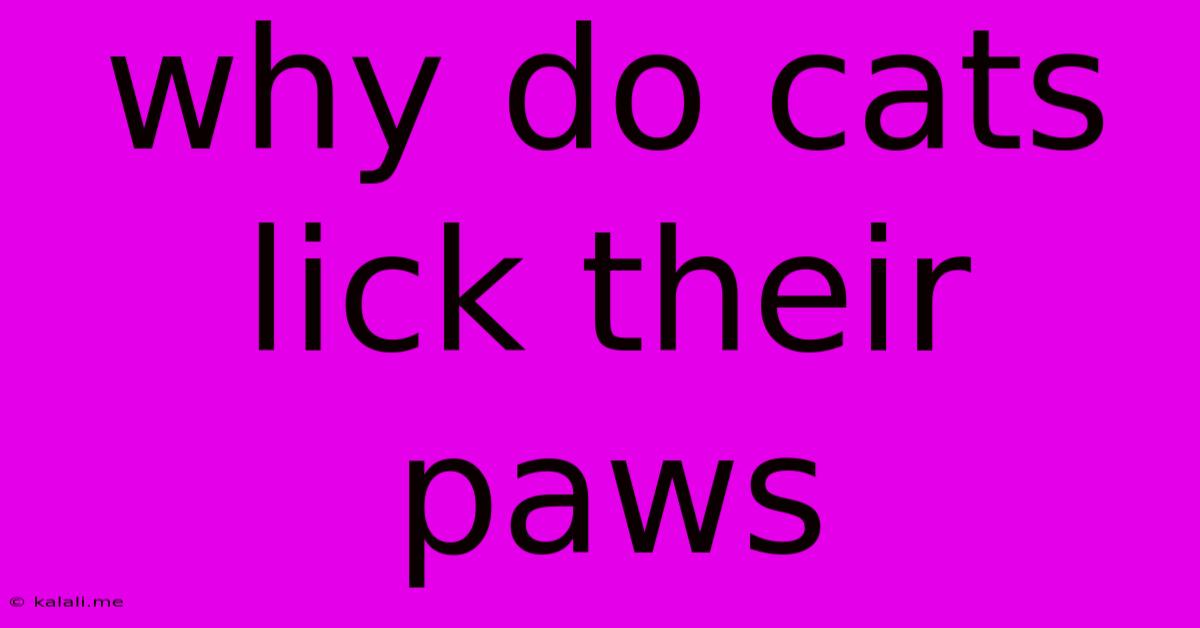Why Do Cats Lick Their Paws
Kalali
Jun 09, 2025 · 3 min read

Table of Contents
Why Do Cats Lick Their Paws? The Mystery Behind the Feline Ritual
Cats licking their paws is a common sight, a seemingly innocuous behavior that often goes unnoticed. But this seemingly simple act is actually a complex behavior with a variety of functions, from hygiene to communication. Understanding why cats lick their paws can offer valuable insights into their well-being and overall health. This article delves into the various reasons behind this feline ritual, exploring the multifaceted nature of this seemingly mundane habit.
The Primary Reasons for Paw Licking:
Cats are meticulous groomers, and paw licking forms a significant part of their daily hygiene routine. There are several key reasons why they engage in this behavior:
-
Cleaning: This is the most obvious reason. Cats use their tongues to remove dirt, debris, and parasites from their paws. Their rough tongues act like natural grooming tools, effectively scrubbing away anything stuck between their toes or on their pads. Think of it as their equivalent of a shower!
-
Temperature Regulation: Cats' paws contain sweat glands, although fewer than humans. Licking their paws can help them cool down, especially in warmer temperatures. The evaporation of saliva from their fur has a cooling effect. This is particularly noticeable during hot weather or after strenuous activity.
-
Scent Marking: Cats have scent glands in their paws. By licking their paws and then rubbing them on surfaces, they are transferring their scent, marking their territory and communicating with other cats. This is a subtle but crucial aspect of feline communication. This behavior is more prominent in unneutered cats.
-
Wound Care: If a cat has a minor injury on their paw, they may lick it to clean the wound and promote healing. Saliva contains enzymes that have some antiseptic properties. However, excessive licking can also hinder healing and may lead to infection. Therefore, monitoring any excessive paw licking is important.
-
Stress and Anxiety: Paw licking can also be a sign of stress or anxiety. Just like humans might bite their nails when stressed, cats may excessively lick their paws as a way to self-soothe. If you notice a sudden increase in paw licking, consider whether there are any changes in your cat's environment or routine that might be causing stress.
-
Allergies and Skin Conditions: Excessive licking can be a symptom of underlying health issues, such as allergies or skin conditions. If your cat is licking their paws excessively, or if the paws appear red, inflamed, or irritated, it's essential to consult a veterinarian to rule out any medical problems. This is especially important if there's hair loss or scabbing involved.
Understanding the Subtleties of Paw Licking:
Observing the frequency, intensity, and location of paw licking can provide valuable clues about your cat's health and emotional state. For instance, occasional licking is normal, but excessive or compulsive licking warrants attention. Pay close attention to any changes in your cat's behavior and seek veterinary advice if you are concerned.
Conclusion:
Paw licking is a natural behavior for cats, playing a vital role in hygiene, communication, and thermoregulation. While it’s often a harmless activity, excessive paw licking can indicate underlying medical or behavioral issues. By understanding the various reasons behind this common feline habit, cat owners can better monitor their pet's health and well-being, ensuring a happy and healthy life for their furry friend. Regular check-ups with your veterinarian are crucial for maintaining your cat's overall health.
Latest Posts
Latest Posts
-
How To Keep A Rooster From Crowing
Jun 10, 2025
-
Im Not Going To Let Your Lack Of Experience
Jun 10, 2025
-
Conditional Formatting For A Specific Time Frame Google Sheets
Jun 10, 2025
-
How Do I Right Click On Iphone
Jun 10, 2025
-
If P Then Q If Q Then P
Jun 10, 2025
Related Post
Thank you for visiting our website which covers about Why Do Cats Lick Their Paws . We hope the information provided has been useful to you. Feel free to contact us if you have any questions or need further assistance. See you next time and don't miss to bookmark.